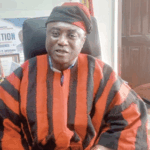
The Ghana National Association of Teachers (GNAT) has urged managers of the local education ecosystem to sit around the table to establish the root cause of examination malpractice in the wake of the unending penchant to cheat in transitional examinations.
It said this should help find a solution to the exam cheating canker.
It said it was time for the players to sit back and ask what was wrong with the examination system since people were finding every means possible to circumvent it.
The General Secretary of GNAT, Thomas Musah, made the call in an interview with the Daily Graphic.
He cited the prosecution of invigilators and dismissal of Ghana Education Service (GES) staff caught engaging in illegality and seizure of mobile phones as some of the steps taken to arrest the problem, yet malpractice persisted and was on the ascendancy.
He further cited the killing of Asare Menako, a member of staff of the West African Examinations Council (WAEC) who tried to stop students from cheating in an examination but was stabbed in the process.
“Some teachers have had their appointments terminated, and some students have had their results cancelled.
“Rewriting, they’ve been doing it. What kind of punishment have we not meted out to individuals? Some have even died,” Mr. Musah bemoaned.
The monitoring teams set up by WAEC for this year’s West African Senior School Certificate Examination for School Candidates (WASSCE-SC) uncovered a high number of irregularities and cheating by some candidates and invigilators.
The irregularities include impersonation, taking snapshots of questions, providing solutions, and carrying mobile phones into the examination halls.
Consequently, more than 16 persons were picked up at various examination centres, resulting in the seizure of 64 mobile phones in one school alone, as investigations continue into the malpractice.
At the release of this year’s Basic Education Certificate Examination (BECE) results, the council withheld and cancelled some results as a result of illegalities.
Since 2023, over 50,000 WASSCE subject papers have been cancelled each year.
Managers
Mr. Musah said that while stakeholders blamed one another for the problem, the biggest loser was the state, adding that managers of education needed to sit back and ask what was wrong with the educational system.
He said the Ministry of Education, the GES and the government had stressed the need for a stop to the practice; unfortunately, it was ongoing.
“Let us sit and ask why people cheat; what is the root cause? Let us find out. Is it the mode of assessment? Let us ask all the questions.”
“How can we do things differently such that our children will not think that examination is the final determination? If you don’t pass, then the world has come to an end,” he said.
The GNAT General Secretary stated that it was unfortunate that students who failed examinations were perceived as less intelligent compared to those who passed the BECE and gained admission to popular schools, such as Wesley Girls and the Presbyterian Boys, among others.
Those children, he said, rather needed encouragement instead of dampening of their spirit, which might discourage them, imploring others to also try and circumvent the system.
In dealing with the problem, he wondered whether it was not possible that “in this time and age, we deploy some kind of AI or we deploy some kind of robots to help us or include the CCTV cameras and all that.”
Mr. Musah described the issue of examination malpractice as a worrying development and said that there was a need to get to the core of the matter. He said he was concerned that stakeholders were always dealing with the effect and that there was a need to look at the cause.
Demystify
He said that because everybody wanted to get eighth-grade ones, they would do anything to circumvent the system to get them, to the extent that there were schools that were ready to aid students to achieve that, to sustain their market share of the population.
“We need to find a way out of demystifying examination for the children to realise that it is not the last stop of their lives,” he said.
“Go to other areas. If you go to the Arab world, in which language do they learn? Arabic.
That is to tell us that education is not about the language that you can speak fluently.
Somebody can learn medicine in Twi, somebody can learn medicine in Ga, somebody can learn medicine in Buli, and all that. It is just the way of communication,” he said.
Mr. Musah noted that in some countries, top doctors do not even speak English. “But in Ghana, we have turned examinations into a kind of fetish. Examinations have become everything to us.”
Moreover, he said the educational system should be designed in such a way that the career path would be clear for any person who took it up.
He said that because the career path in most educational programmes was not clear, students ended up being frustrated.
He said that because of that, every student wanted to study Science or General Arts.
Mr. Musah said there was a need to ask why, every year, the conversation on examination malpractice kept coming up.




